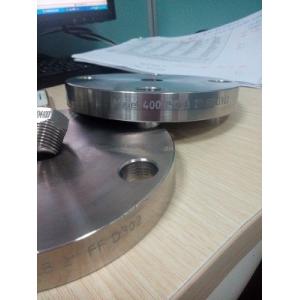

Add to Cart
UNS N04400
Other common names: Alloy 400
Monel 400 is a nickel-copper alloy (about 67% Ni – 23% Cu) that is
resistant to sea water and steam at high temperatures as well as to
salt and caustic solutions. Alloy 400 is a solid solution alloy
that can only be hardened by cold working. This nickel alloy
exhibits characteristics like good corrosion resistance, good
weldability and high strength. A low corrosion rate in rapidly
flowing brackish or seawater combined with excellent resistance to
stress-corrosion cracking in most freshwaters, and its resistance
to a variety of corrosive conditions led to its wide use in marine
applications and other non-oxidizing chloride solutions. This
nickel alloy is particularly resistant to hydrochloric and
hydrofluoric acids when they are de-aerated. As would be expected
from its high copper content, alloy 400 is rapidly attacked by
nitric acid and ammonia systems.
Monel 400 has great mechanical properties at subzero temperatures,
can be used in temperatures up to 1000° F, and its melting point is
2370-2460° F. However, alloy 400 is low in strength in the annealed
condition so, a variety of tempers may be used to increase the
strength.
In what forms is Monel 400 Available?
• Sheet
• Plate
• Bar
• Pipe & Tube (welded & seamless)
• Fittings (i.e. flanges, slip-ons, blinds, weld-necks, lapjoints,
long welding necks, socket welds, elbows, tees, stub-ends, returns,
caps, crosses, reducers, and pipe nipples)
• Wire
What are the characteristics of Monel 400?
• Resistant to seawater and steam at high temperatures
• Excellent resistance to rapidly flowing brackish water or
seawater
• Excellent resistance to stress corrosion cracking in most
freshwaters
• Particularly resistant to hydrochloric and hydrofluoric acids
when they are de-aerated
• Offers some resistance to hydrochloric and sulfuric acids at
modest temperatures and concentrations, but is seldom the material
of choice for these acids
• Excellent resistance to neutral and alkaline salt
• Resistance to chloride induced stress corrosion cracking
• Good mechanical properties from sub-zero temperatures up to 1020°
F
• High resistance to alkalis
| C | Mn | S | Si | Ni | Cu | Fe |
| .30 max | 2.00 max | .024 max | .50 max | 63.0 min | 28.0-34.0 | 2.50 max |
Corrosion Resistant Monel 400
Alloy 400 is virtually immune to chloride ion stress corrosion
cracking in typical environments. Generally, its corrosion
resistance is very good in reducing environments, but poor in
oxidizing conditions. It is not useful in oxidizing acids, such as
nitric acid and nitrous. Nevertheless, it is resistant to most
alkalis, salts, waters, food products, organic substances and
atmospheric conditions at normal and elevated temperatures.
This nickel alloy is attacked in sulfur-bearing gases above
approximately 700° F and molten sulfur attacks the alloy at
temperatures over approximately 500° F.
Monel 400 offers about the same corrosion resistance as nickel but
with higher maximum working pressures and temperatures and at a
lower cost due to its superior ability to be machined.
In what applications is Monel 400 used?
• Marine engineering
• Chemical and hydrocarbon processing equipment
• Gasoline and freshwater tanks
• Crude petroleum stills
• De-aerating heaters
• Boiler feed water heaters and other heat exchangers
• Valves, pumps, shafts, fittings, and fasteners
• Industrial heat exchangers
• Chlorinated solvents
• Crude oil distillation towers
Fabrication with Monel 400
Alloy 400 can easily be welded by gas-tungsten arc, gas metal arc
or shielded metal arc processes using appropriate filler metals.
There is no need for post weld heat treatment, however, thorough
cleaning after welding is critical for optimum corrosion
resistance, otherwise there is the risk of contamination and
embrittlement.
Finished fabrications can be produced to a wide range of mechanical
properties when proper control of the amount of hot or cold working
and the selection of appropriate thermal treatments is done.
Like most other nickel alloys, Monel 400 is typically tough to
machine and will work harden. However, excellent results can e
obtained if you make the correct choices for tooling and machining.
| Pipe Smls | Pipe Welded | Tube Smls | Tube Welded | Sheet/Plate | Bar | Forging | Fitting | Wire |
| B165 | B725 | B163 | B127 | B164 | B564 | B366 |
| Product Form | Condition | Tensile (ksi) | .2% Yield (ksi) | Elongation (%) | Hardness (HRB) |
| Rod & Bar | Annealed | 75-90 | 25-50 | 60-35 | 60-80 |
| Rod & Bar | Cold-Drawn Stress Relieved | 84-120 | 55-100 | 40-22 | 85-20 HRC |
| Plate | Annealed | 70-85 | 28-50 | 50-35 | 60-76 |
| Sheet | Annealed | 70-85 | 30-45 | 45-35 | 65-80 |
| Tube & Pipe Seamless | Annealed | 70-85 | 25-45 | 50-35 | 75 max * |
*The ranges shown are composites for various product sizes and
therefore are not suitable for specification purposes. Hardness
values are suitable for specification purposes provided tensile
properties are not also specified..
Alloy 400 Trivia
*Alloy 400 is slightly magnetic at room temperature.
*This alloy has a long history of use as a corrosion resistant
material, dating back to the early 20th century when it was
developed as an attempt to use a high copper content nickel ore.
The nickel and copper contents of the ore were in the approximate
ratio which is now formally specified for the alloy.
We can provide Monel 400 material in the form of flange, fittings, pipes.
